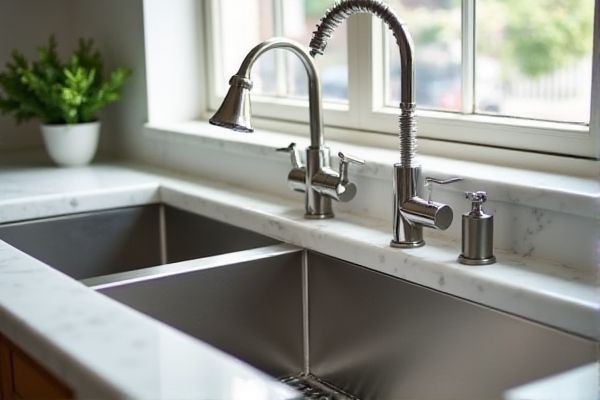
Farmhouse sinks offer a deep basin and rustic charm perfect for traditional kitchens, while stainless steel sinks provide durability, modern aesthetics, and resistance to stains and heat. Explore the detailed comparison to determine which sink best suits Your kitchen needs and style preferences.
Table of Comparison
| Feature | Farmhouse Sink | Stainless Steel Sink |
|---|---|---|
| Material | Fireclay, cast iron, or stone | Stainless steel alloy |
| Design | Exposed front apron, deep basin | Drop-in, undermount, or flush mount |
| Durability | Highly durable but prone to chips | Resistant to rust and dents |
| Maintenance | Requires gentle cleaning to avoid damage | Easy to clean and maintain |
| Noise | Quiet operation | Can be noisy without soundproofing |
| Cost | Higher price range | Generally more affordable |
| Style | Traditional, rustic appeal | Modern, sleek appearance |
| Installation | Requires custom cabinetry | Standard installation process |
Introduction: Comparing Farmhouse and Stainless Steel Sinks
Farmhouse sinks feature deep basins crafted from materials like fireclay or cast iron, offering a classic aesthetic and superior durability, ideal for large kitchen tasks. Stainless steel sinks provide a sleek, modern look with high resistance to stains, heat, and corrosion, making them popular in contemporary kitchens. Both designs differ in maintenance requirements, noise levels, and installation styles, influencing kitchen functionality and decor choices.
Design and Aesthetic Appeal
Farmhouse sinks showcase a deep basin with an exposed front apron, creating a rustic and charming aesthetic that complements traditional or country-style kitchens. Stainless steel sinks offer a sleek, modern design with a reflective surface that integrates seamlessly into contemporary and industrial kitchen settings. Your choice between the two hinges on whether you prefer the warm, vintage appeal of a farmhouse sink or the clean, minimalist look of stainless steel.
Material Composition and Durability
Farmhouse sinks are typically made from fireclay or cast iron coated with enamel, providing robust resistance to chipping and staining, which ensures long-term durability in kitchen environments. Stainless steel sinks are crafted from high-grade steel alloy, known for its corrosion resistance, impact strength, and ease of maintenance, making them highly durable under heavy use. Both materials offer unique advantages: farmhouse sinks deliver a classic aesthetic with strong resistance to wear, while stainless steel sinks excel in hygiene and longevity due to their non-porous surface and adaptability.
Installation Process and Requirements
Farmhouse sinks require precise cutouts and reinforcement in cabinetry due to their front-exposed design and heavier weight, often necessitating additional support brackets and professional installation. Stainless steel sinks offer more straightforward installation, typically fitting standard countertop cutouts with clips and sealants, making them suitable for DIY projects. The installation complexity of farmhouse sinks often results in higher labor costs and longer project timelines compared to the more flexible and lightweight stainless steel options.
Functionality and Usability
Farmhouse sinks offer deep basins ideal for handling large pots and pans, enhancing functionality in busy kitchens, while stainless steel sinks provide durability and resistance to stains and heat, making them highly practical for everyday use. The apron front design of farmhouse sinks allows for easier access and reduces strain during prolonged dishwashing, whereas stainless steel sinks often feature multiple bowls that improve multitasking and drainage efficiency. Both sink types support diverse kitchen workflows but differ in maintenance, with stainless steel requiring less upkeep and farmhouse sinks demanding careful cleaning to prevent staining.
Maintenance and Cleaning Needs
Farmhouse sinks, typically made from materials like fireclay or cast iron, require gentle cleaning with non-abrasive cleaners to prevent surface damage and maintain their glossy finish. Stainless steel sinks are highly durable and resist stains and rust, making them easier to clean with mild detergents and a soft cloth while offering superior resistance to dents and scratches. Regular maintenance of farmhouse sinks involves avoiding harsh chemicals to prevent glaze chipping, whereas stainless steel sinks benefit from occasional polishing to retain their shine and prevent water spots.
Cost and Budget Considerations
Farmhouse sinks typically cost between $400 and $1,200, with installation adding $200 to $400, making them a higher-budget option compared to stainless steel sinks, which range from $150 to $600 with lower installation expenses. The durability of stainless steel sinks also offers long-term value due to resistance to stains and heat. Budget-conscious homeowners often prefer stainless steel sinks for affordable pricing and easier maintenance.
Suitability for Different Kitchen Styles
Farmhouse sinks with their deep basins and apron fronts complement rustic, traditional, and farmhouse-style kitchens by adding a vintage charm and practical functionality. Stainless steel sinks offer a sleek, modern look that suits contemporary, industrial, and minimalist kitchen designs, providing durability and easy maintenance. Your choice between these sink types can significantly enhance the overall aesthetic and functionality of your kitchen space.
Pros and Cons of Farmhouse Sinks
Farmhouse sinks offer a stylish, deep basin ideal for handling large pots and pans, making them perfect for busy kitchens, but their installation often requires custom cabinetry, increasing costs. They are typically made from durable materials like fireclay or porcelain, which resist stains and scratches but can chip or crack if heavy objects are dropped. Your choice depends on balancing the farmhouse sink's aesthetic appeal and spacious functionality against its higher maintenance and installation complexity.
Pros and Cons of Stainless Steel Sinks
Stainless steel sinks offer durability, resistance to heat and stains, and ease of cleaning, making them a popular choice for busy kitchens. However, they can be prone to scratching, denting, and noise from running water or dishes, which may affect their appearance over time. Your decision between farmhouse and stainless steel sinks depends on your preference for style versus practicality and maintenance.
 homyna.com
homyna.com